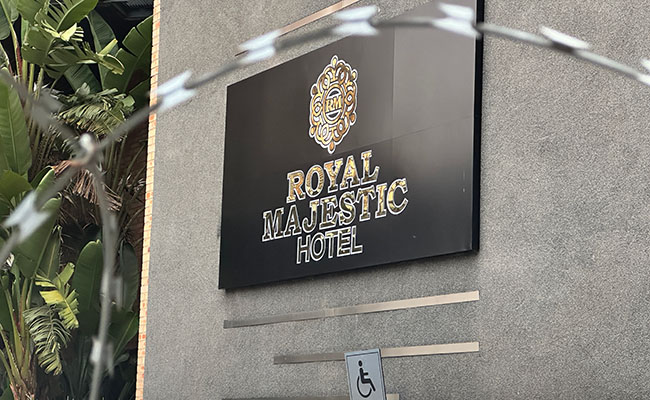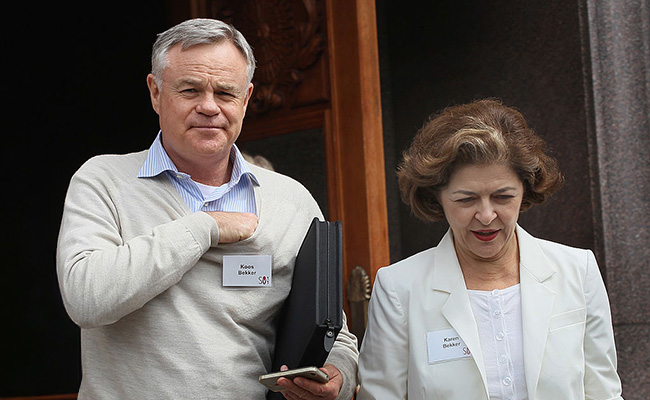
This article was originally published on 29 August 2025.
The Hyatt in Rosebank is South Africa’s most visible hotel corpse. Shuttered for three years, the once-proud five-star hotel in a bustling business district has been on a long meandering journey to nowhere, a monument to neglect by the owner, Bin Otaiba Hotels.
Now, finally, signs of development at the hotel suggests a looming clash between Bin Otaiba, headquartered in Sharjah in the United Arab Emirates, and the Hyatt Regency brand, with which it still has a management agreement.
This is just one casualty in a wider pattern: across South Africa, hotels owned by Bin Otaiba have been plagued by unpaid debts, disputes and closures.
For years, the Rosebank Hyatt has remained shrouded in barbed wire. But in recent days, signboards have popped up around the property reading: “RM – Royal Majestic Hotel.”
An insider told Currency that an invoice of R120,000 has been approved for a new rooftop sign to replace the Hyatt branding. If so, that sets up a high-profile corporate clash, as the Hyatt is still believed to hold a long-term contract with Bin Otaiba Hotels, with a 10-year renewal clause. In other words, the Hyatt controls whether the deal is extended.
But even the rebranding has been riddled with blunders. During the design phase, the signs almost went through with spelling mistakes, dubbing it the “Royal Magestic Hotel”, a source told Currency.
The signs alarmed neighbouring landlords, who say they spotted the owners on site more regularly in recent weeks. But if the Hyatt name is jettisoned, it signals a breakdown in the already fraught relationship between Bin Otaiba and one of the world’s most respected hotel operators.
However, it has proven impossible to get insight into Bin Otaiba’s plans for the hotel, or the extent of the fallout with the Hyatt, as it did not respond to requests for comment.
Collateral damage
The Sharjah-based group owns a number of hotels in South Africa, besides the Rosebank Hyatt. These include the Hilton in Durban, the Radisson Blu Le Vendome in Sea Point, the Park Inn in Sandton and the historic King Edward Hotel in Gqeberha.
On its website, the Bin Otaiba Investment Group says: “We acquire, develop and manage high-quality hospitality real estate assets,” and these South African hotels are flagship properties.
Yet its plans remain opaque, since the group’s chair, Khalaf Ahmed Khalaf Al Otaiba – described in the Emirati press as a “self-made tycoon” – is keeping his cards close to his chest.
But the Rosebank Hyatt’s closure hasn’t just scarred the skyline of the trendy district – it has dragged nearby properties down too.
The neighbouring Firs retail and office complex, owned by the Burstone Group (which was previously the Investec Property Fund), shares municipal services with the hotel.
When Bin Otaiba stopped paying the Hyatt’s share of its utility bills, Burstone covered the shortfall to prevent the precinct from being cut off. At one stage, a source says, the arrears reached R16m.
Burstone sued Bin Otaiba and won, with the court freezing the hotel’s accounts. But even after a settlement was reached, a source says the Emirati group has not made all the payments it was meant to.
Parking was another sore point. Burstone Group leased 75 bays to the Hyatt at about R90,000 a month. Only, Currency understands payment for leasing the parking bays has been irregular over the years, and the account remains in arrears.
For the retailers inside the Firs — some of whom have been trading for more than 35 years — the hotel’s closure has been catastrophic. Restaurants and boutiques that once thrived on high-end hotel traffic endured their worst years in decades. Some shut shop altogether.
This is not unique to Bin Otaiba’s Rosebank hotel, however.
Allegations of a trail of decay have stalked its other South African assets too: in Durban, the Hilton’s claims for unpaid debts ran into the tens of millions, and inspectors flagged “unacceptable” conditions at Cape Town’s Radisson Blu Le Vendome. Further afield, fire safety lapses were cited at the Park Inn in Cardiff.
The pattern is consistent: brand partners complain of being locked out of sites and ignored on renovation demands. It suggests a landlord unwilling to invest, yet reluctant to sell.
Corner of shame
For Rosebank, the Hyatt’s absence is especially painful. Billions have been invested in the district over the past decade, transforming it into a rival to Sandton: a more walkable, accessible and vibrant area.
Yet on the prized corner of Oxford Road and Biermann Avenue sits a lifeless hulk preserved in concrete – except with a new name. For nearby retailers, the name on the signboards matters less than whether the lights are still burning – the district needs a functioning hotel.
While Bin Otaiba has not provided details of its management agreement, putting up signs for the ‘Royal Majestic’ raises contractual questions, including whether the Hyatt is walking away, or if this is simply brinkmanship by a difficult landlord.
Spokespeople for the Hyatt didn’t immediately respond to requests for comment.
This debacle is a cautionary tale of what happens in the hotel sector when ownership is divorced from accountability. International brands bring nameplates and standards, but the buildings belong to owners. But when those owners fail to invest, brands remain hamstrung.
Even governments have limited tools: while eThekwini forced the Hilton in Durban to reopen, Joburg has fewer levers, and Cape Town is stuck in a quagmire of legal warnings.
Though the Rosebank Hyatt has been little more than Joburg’s most expensive storage unit since Covid, Bin Otaiba still insists it creates long-term value. Yet its South African track record, of shuttered properties, unpaid debts and soured partnerships, suggests otherwise.
Top image: Vernon Wessels.
Sign up to Currency’s weekly newsletters to receive your own bulletin of weekday news and weekend treats. Register here.















I also have monies outstanding from the Hyatt hotel when it was still open!!